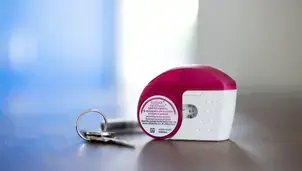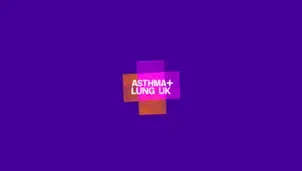Asthma + Lung UK is working in collaboration with NHS England, NHS Scotland, NHS Wales and Department of Health (Northern Ireland) to support you to make changes so you can live better with your lung condition and help the environment at the same time.
This project has been supported through a funded partnership with NHS England.

Four simple inhaler changes
1. If you use a preventer or MART inhaler, take it every day, as prescribed
Taking your preventer or MART inhaler helps you to avoid an asthma attack or COPD flare-up. Avoiding an asthma attack or COPD flare-up will help you stay well and out of hospital, so you’ll have less symptoms and need to use fewer reliever inhalers overall. This is good for you and the environment.
Read more about how your preventer inhaler lowers your risk of asthma symptoms and asthma attacks.
Find out about the different inhalers used to treat COPD.

2. Use the right inhaler technique
Using the correct technique every time you take your inhalers is really important. For example, if you use the right technique every time you use your preventer inhaler or maintenance inhaler, you will be less likely to need your reliever or rescue inhaler to deal with symptoms.
Not sure of the best inhaler technique? It’s quick and easy to check by watching our short inhaler technique videos or speaking to your healthcare professional at your pharmacy or GP practice.
If you use a pressurised metered dose inhaler (pMDI), you might also want to think about using a spacer. Using a spacer helps the right amount of medicine get to your lungs, where it’s needed. This helps to reduce side effects and means less medicine is wasted. You may also find it easier to take your medicine with a spacer.
However, if you’re using a dry powder inhaler (DPI) or a soft mist inhaler (SMI), you don’t need to use a spacer.
Read more about spacers, including how to use one.
3. Together with a healthcare professional, discuss changing to a lower-carbon inhaler
Next time you visit your doctor, respiratory nurse or pharmacist, speak to them about changing to a more environmentally-friendly inhaler.
Find out more about lower-carbon inhalers and why they are better for the environment.
You can also speak to Asthma + Lung UK’s Helpline if you have any questions about changing inhaler. Our friendly respiratory nurse specialists and healthcare advisors can be reached on 0300 222 5800 (Monday to Friday, 9am to 5pm).
4. Take used inhalers back to your local pharmacy for disposal
Don’t put your used inhalers in the bin – instead, take them to your local pharmacy for disposal the next time you visit. They’ll get rid of them in the most environmentally-friendly way and you’ll make a difference to our environment.
Read more about inhaler disposal on our page about how inhalers affect the environment.

In this video, Naomi, a Respiratory Nurse Specialist at Asthma + Lung UK, explains how you can make four simple inhaler changes to help your lung condition, as well as the environment. It's important to discuss any inhaler changes with your GP, respiratory nurse or pharmacist.
Four simple inhaler changes to help your lung condition
Inhalers are important for lots of people with lung conditions. This is because they help to treat the condition in your lungs. Here are four steps you can take to start feeling better today and help the environment at the same time.
1. Take your preventer inhaler every day, as prescribed
This image shows an airway of a person with poorly controlled asthma, COPD or another lung condition where inhalers are needed. Their airway has become narrow and has lots of excess mucus. Using your preventer inhaler every day, as prescribed, helps prevent this from happening. It treats the condition in your lungs to help you avoid an asthma attack or flare-up. It will help you stay well, meaning fewer appointments, hospital stays or disruptions to your life. Your reliever inhaler is different. It treats symptoms quickly when they come on, but it doesn't treat your underlying condition. Your reliever inhaler should only be used when your symptoms are getting worse or you're having an asthma attack or flare-up.
2. Use the right inhaler technique
A good inhaler technique makes a big difference to how much medicine gets into your airways. The way you use your inhaler might not be something you think about very often, but getting it right is quick and easy, and it'll help you feel your best. Speak to your doctor, nurse or pharmacist, or call Asthma + Lung UK's helpline for help on getting the right inhaler technique.
3. Together with a healthcare professional, change to a lower-carbon inhaler
Together with your doctor, nurse or pharmacist, you can review your current inhaler and find the best one to manage your symptoms. Some inhalers are better for the environment too, so you'll be looking after yourself and helping the environment at the same time.
4. Take used inhalers back to your local pharmacy for disposal
Don't put your used inhalers in the bin. Instead, take them to your local pharmacy the next time you visit. They'll get rid of them in the most environmentally-friendly way. These simple changes could help your lungs and the environment at the same time. Speak to your healthcare professional today to get started, or contact us for expert advice from our helpline.
Read this page in your language
Read this page in Arabic
Read this page in Bengali
Read this page in Gujarati
Read this page in Polish
Read this page in Punjabi (Gurmukhī script)
Read this page in Punjabi (Shahmukhi script)
Read this page in Simplified Chinese
Read this page in Urdu
Read this page in Welsh
Easy read inhaler choices resource
Download the easy read inhaler choices resource

Watch this video in Arabic

Watch this video in Bengali

Watch this video in Gujarati

Watch this video in Polish

Watch this video in Punjabi (Gurmukhi)

Watch this video in Punjabi (Shahmukhi)

Watch this video in Simplified Chinese

Watch this video in Urdu
Changing your inhaler - Lara's story
I'm Lara and I live with a lung condition called asthma.
I was diagnosed in my mid-twenties.
I changed my inhaler a few years ago. It was suggested to me by my GP that it might help improve my asthma control.
In the past I was using a brown inhaler, it was an aerosol. Now I use a dry powder inhaler and that's my preventer that I take each day.
At first I was a bit rigid to the change and I thought 'How am I going to use the new one? How am I going to learn how to do it?'
But then when they suggested that it actually might help my asthma control and they explained it's not that difficult to use, it's quite easy, that then reassured me and then I thought 'Why not give it a go?'
I actually really like using it because it's really simple to use. There's extra benefits, like it's really easy to carry around in my handbag.
I had to use a spacer with my old inhaler.
The technique to use it is a lot more simpler as well. It benefited my asthma a lot.
I found putting a reminder on my phone, morning and evening, was really helpful to make sure I remembered to take my inhaler. That really helped me get that routine.
When you first get asked about changing your inhaler you might be feeling a bit anxious about it and it could be a bit of a scary thought
about learning a new inhaler but actually be open to that change.
I found I wished I'd done it years ago because it can really benefit your asthma and can help the environment at the same time.
Read more
Inhaler choices poster
Inhaler choices handout
Read the inhaler choices handout in your language
Read the handout in Arabic
Read the handout in Bengali
Read the handout in Gujarati
Read the handout in Polish
Read the handout in Punjabi (Gurmukhī script)
Read the handout in Punjabi (Shahmukhi script)
Read the handout in Simplified Chinese
Read the handout in Urdu

Get support
Call our Helpline for support with your condition. Get advice on your medicines, symptoms or travelling with a lung condition, or just call us to say hello.







